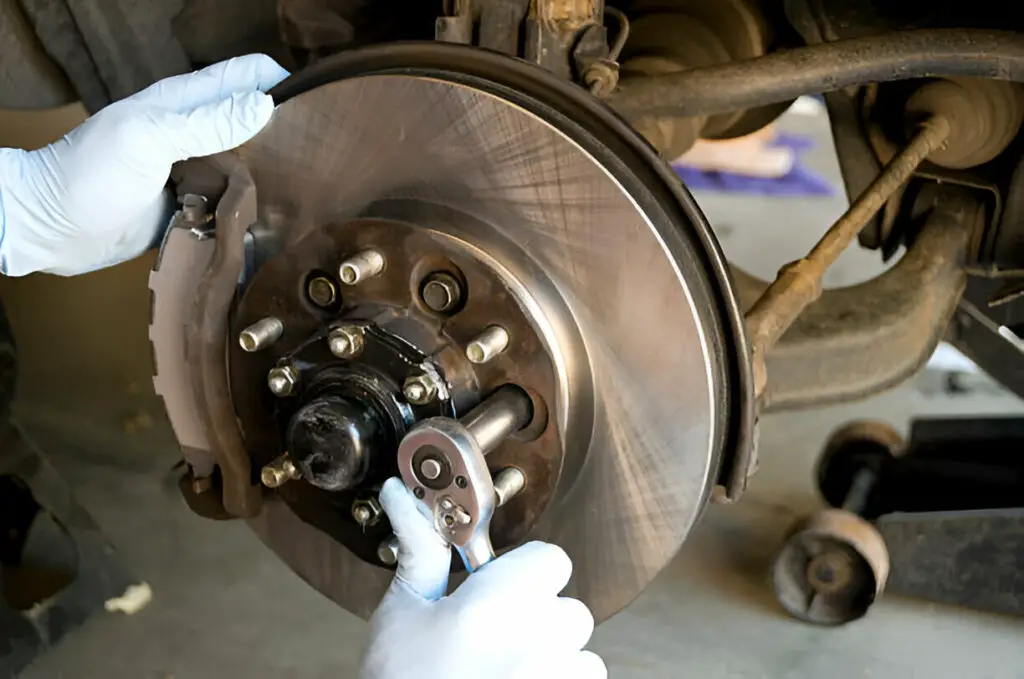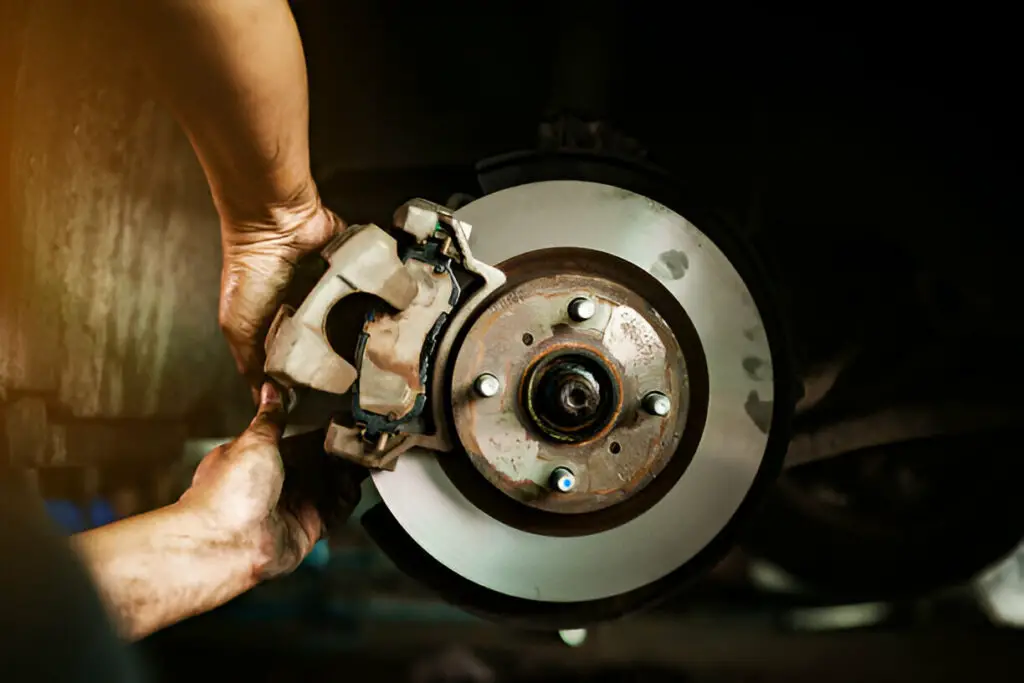Brake calipers sticking can be caused by dirt, corrosion, or lack of lubrication. This issue can lead to uneven braking and potential safety hazards.
Brakes are one of the most important components of any vehicle, ensuring safety and control while driving. Among the various parts of a braking system, brake calipers play a pivotal role in clamping the brake pads against the rotors to slow down or stop the car. When brake calipers stick, it can lead to severe problems, affecting the car’s braking efficiency and safety.
In this comprehensive blog post, we’ll delve into the causes, symptoms, and solutions for brake calipers sticking.

Contents
What is Brake Calipers?
Brake calipers are part of the disc brake system, which is commonly used in modern vehicles. They house the brake pads and use hydraulic pressure to push these pads against the brake rotor, creating friction that slows down the wheel. Calipers come in two main types: floating (or sliding) calipers and fixed calipers. Floating calipers move in and out relative to the rotor, while fixed calipers have pistons on both sides of the rotor.
Causes of Brake Calipers Sticking
Sticking brake calipers can be caused by a variety of issues, ranging from mechanical failures to environmental factors. Here are the most common causes:
1. Corrosion and Rust
Corrosion and rust can build up on the caliper pistons and slides, preventing them from moving freely. This is particularly common in areas with harsh winters or where road salt is used.
2. Worn or Damaged Caliper Pistons
Over time, the caliper pistons can wear out or get damaged, leading to sticking. The pistons are responsible for pushing the brake pads against the rotor, and any damage can impair their function.
3. Old or Contaminated Brake Fluid
Brake fluid absorbs moisture over time, which can cause internal corrosion and lead to sticking calipers. Contaminated brake fluid can also affect the hydraulic pressure within the system.
4. Faulty Brake Hose
A deteriorating brake hose can act like a one-way valve, allowing brake fluid to apply pressure to the caliper but not releasing it, causing the caliper to stick.
5. Improper Installation or Maintenance
Incorrect installation of brake components or lack of regular maintenance can lead to sticking calipers. For example, not lubricating the caliper slides properly can cause them to seize.
6. Seized Guide Pins
Guide pins, which help the caliper move smoothly, can become seized due to lack of lubrication or the buildup of dirt and grime, leading to sticking.
Symptoms of Sticking Brake Calipers
Recognizing the symptoms of sticking brake calipers early can prevent further damage and ensure your safety on the road. Here are some common signs:
- Vehicle Pulling to One Side: If a caliper sticks, it can cause uneven braking force, making the vehicle pull to one side when you apply the brakes.
- Braking Noise: Unusual noises such as grinding, squealing, or clunking when applying the brakes can indicate a problem with the calipers.
- Reduced Braking Performance: Sticking calipers can lead to decreased braking efficiency, making it harder to slow down or stop the vehicle.
- Overheating Brakes: If a caliper is stuck, it can cause continuous contact between the brake pad and rotor, leading to overheating. This can be noticed by a burning smell or smoke coming from the wheels.
- Increased Brake Dust: Excessive brake dust on one wheel can indicate that a caliper is sticking, as it causes more wear on the brake pads.
- Uneven Brake Pad Wear: Inspecting the brake pads for uneven wear can reveal a sticking caliper. One pad may be significantly more worn than the others.

How to Diagnose Sticking Brake Calipers
Diagnosing sticking brake calipers requires a systematic approach to identify the root cause. Here are the steps to diagnose the issue:
- Visual Inspection: Start with a visual inspection of the brake calipers, rotors, and pads. Look for signs of rust, corrosion, and uneven wear.
- Check Brake Fluid: Examine the brake fluid for contamination or low levels. Dark, murky brake fluid indicates it’s time for a change.
- Test Drive: Take the vehicle for a test drive to observe any pulling, noise, or reduced braking performance.
- Temperature Check: After driving, carefully touch the wheels (or use an infrared thermometer) to check for excessive heat. A hot wheel can indicate a sticking caliper.
- Inspect Guide Pins: Remove the caliper and inspect the guide pins for smooth movement. Clean and lubricate them if necessary.
- Check Brake Hose: Inspect the brake hoses for any signs of damage or leaks. Flex the hoses to see if they’re restricting fluid flow.
How to Fix Sticking Brake Calipers
Once you’ve diagnosed the problem, you can take appropriate steps to fix sticking brake calipers. Depending on the cause, the solution may involve cleaning, lubrication, or replacement of parts.
- Clean and Lubricate Guide Pins: If the guide pins are seized, clean them thoroughly and apply high-temperature brake grease to ensure smooth movement.
- Replace Caliper Pistons: Damaged or corroded caliper pistons should be replaced. This may require rebuilding the caliper or purchasing a new or remanufactured unit.
- Change Brake Fluid: If the brake fluid is old or contaminated, flush the brake system and replace it with fresh fluid. This can prevent internal corrosion and ensure proper hydraulic pressure.
- Replace Brake Hose: A faulty brake hose should be replaced to restore proper fluid flow. This is a relatively inexpensive and straightforward fix.
- Address Corrosion: Remove any rust or corrosion on the caliper and surrounding components. In severe cases, replacing the caliper may be necessary.
- Regular Maintenance: Regularly inspect and maintain your braking system. This includes checking brake fluid levels, lubricating guide pins, and inspecting brake pads and rotors for wear.
Preventing Sticking Brake Calipers
Prevention is always better than cure. Here are some tips to prevent brake calipers from sticking:
Regular Brake Inspections: Schedule regular brake inspections to catch any issues early. A professional mechanic can identify potential problems before they become serious.
Use High-Quality Brake Components: Invest in high-quality brake parts, including calipers, pads, and fluid. Quality components are less likely to fail and can improve overall braking performance.
Keep Components Clean and Lubricated: Regularly clean and lubricate brake components, especially the guide pins and caliper slides. This prevents them from seizing due to dirt or lack of lubrication.
Replace Brake Fluid Periodically: Change the brake fluid according to your vehicle manufacturer’s recommendations. This helps prevent moisture buildup and internal corrosion.
Avoid Harsh Conditions: If possible, avoid driving in harsh conditions such as salty or snowy roads, which can accelerate corrosion. If you must drive in such conditions, clean your vehicle thoroughly afterward.
Monitor Brake Performance: Pay attention to any changes in brake performance, such as pulling, noise, or reduced efficiency. Address these issues promptly to prevent further damage.
Frequently Asked Questions
Here are some FAQs about brake calipers sticking –
How Do You Fix A Sticking Brake Caliper?
To fix a sticking brake caliper, follow these steps:
- Lift the vehicle and remove the wheel.
- Inspect the caliper for any damage or debris.
- Clean the caliper and lubricate the sliding pins.
- Check the brake pads for wear and replace if necessary.
- Reassemble the caliper and test the brakes before driving.
Is It Ok To Drive With A Sticking Caliper?
Yes, it is not safe to drive with a sticking caliper. A sticking caliper can cause uneven braking, overheating of the brake system, and premature wear of brake pads. It is advisable to have the caliper inspected and repaired by a professional mechanic.
What Causes Brake Calipers Not To Release?
Brake calipers may fail to release due to a few reasons such as seized caliper slide pins, a damaged or stuck caliper piston, a faulty brake hose, or a malfunctioning master cylinder. These issues can cause the caliper to remain engaged and lead to brake overheating, uneven wear of brake pads, and reduced braking performance.
How Much Does It Cost To Fix A Sticking Brake Caliper?
The cost to fix a sticking brake caliper can vary depending on the make and model of your vehicle. On average, the cost can range from $150 to $800. However, if the brake caliper needs to be replaced, the cost can be higher.
It is best to have a professional mechanic diagnose the issue and provide an accurate estimate.
What Causes Brake Calipers To Stick?
Brake calipers may stick due to corrosion, dirt, or worn-out parts affecting smooth movement.
Conclusion
Sticking brake calipers are a common but serious issue that can affect your vehicle’s safety and performance. Understanding the causes, recognizing the symptoms, and knowing how to diagnose and fix the problem can help you maintain your brakes in optimal condition. Regular maintenance and proactive care are key to preventing sticking calipers and ensuring your vehicle remains safe on the road.
If you’re ever in doubt about your braking system, don’t hesitate to seek professional assistance to keep your brakes functioning properly and your driving experience safe.